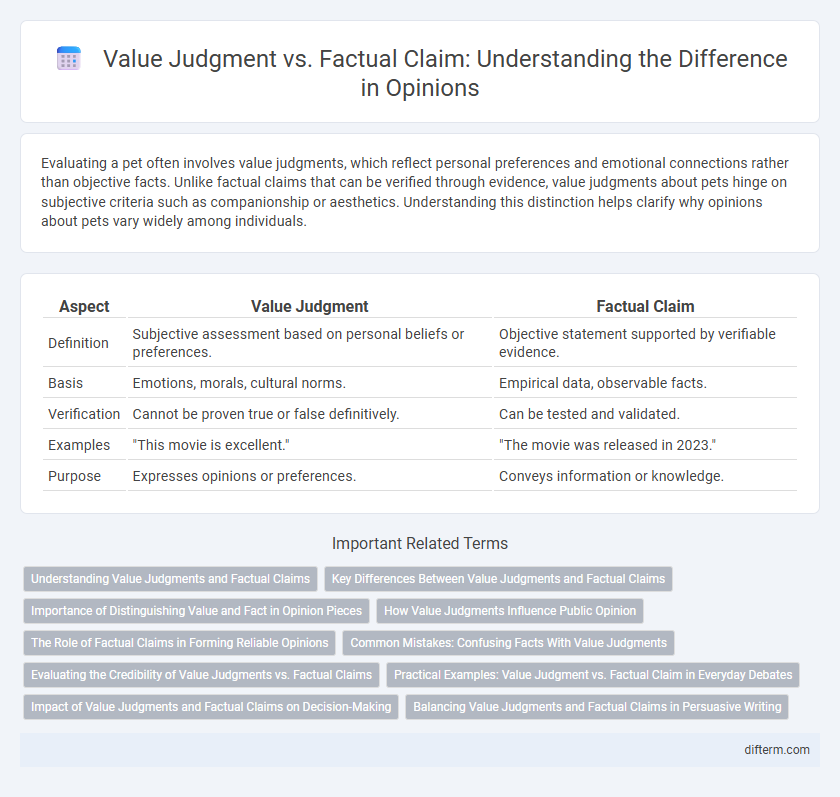Evaluating a pet often involves value judgments, which reflect personal preferences and emotional connections rather than objective facts. Unlike factual claims that can be verified through evidence, value judgments about pets hinge on subjective criteria such as companionship or aesthetics. Understanding this distinction helps clarify why opinions about pets vary widely among individuals.
Table of Comparison
| Aspect | Value Judgment | Factual Claim |
|---|---|---|
| Definition | Subjective assessment based on personal beliefs or preferences. | Objective statement supported by verifiable evidence. |
| Basis | Emotions, morals, cultural norms. | Empirical data, observable facts. |
| Verification | Cannot be proven true or false definitively. | Can be tested and validated. |
| Examples | "This movie is excellent." | "The movie was released in 2023." |
| Purpose | Expresses opinions or preferences. | Conveys information or knowledge. |
Understanding Value Judgments and Factual Claims
Value judgments reflect subjective evaluations based on personal beliefs, emotions, or cultural norms, making them inherently debatable and open to interpretation. Factual claims assert objective information verifiable through evidence, data, or empirical observation, establishing a clear truth or falsehood. Differentiating between these two is crucial for critical thinking, enabling individuals to assess arguments, discern biases, and engage in reasoned discourse.
Key Differences Between Value Judgments and Factual Claims
Value judgments express subjective evaluations based on personal beliefs, emotions, or preferences, making them inherently opinion-based and not verifiable through empirical evidence. Factual claims assert objective statements that can be proven true or false through observation, measurement, or reliable data. Understanding this distinction is crucial for critical thinking and effective communication in debates and decision-making processes.
Importance of Distinguishing Value and Fact in Opinion Pieces
Distinguishing value judgments from factual claims in opinion pieces is crucial for maintaining credibility and fostering informed discourse. Clear separation enables readers to identify subjective perspectives versus objective evidence, enhancing critical thinking and preventing misinformation. Recognizing this distinction supports transparent communication and helps uphold journalistic integrity.
How Value Judgments Influence Public Opinion
Value judgments shape public opinion by framing issues through personal beliefs and cultural norms rather than objective facts. These subjective assessments influence attitudes and decisions by appealing to emotions and moral standards, often overriding empirical evidence. Understanding the impact of value judgments is essential for analyzing social debates and policy-making processes.
The Role of Factual Claims in Forming Reliable Opinions
Factual claims provide a crucial foundation for forming reliable opinions by anchoring judgments in verifiable evidence rather than personal biases or emotions. The accuracy and reliability of these claims enable individuals to evaluate information critically and develop well-informed perspectives. Without factual grounding, opinions risk becoming subjective assertions lacking credibility and consistency.
Common Mistakes: Confusing Facts With Value Judgments
Confusing value judgments with factual claims leads to misunderstandings by blurring objective evidence with personal opinions. People often mistake subjective statements about what ought to be for verifiable truths, causing debates to become emotionally charged rather than logically sound. Clear separation between factual data and evaluative language is essential for effective communication and critical thinking.
Evaluating the Credibility of Value Judgments vs. Factual Claims
Evaluating the credibility of value judgments relies heavily on understanding subjective perspectives, cultural contexts, and the criteria used for assessment, whereas factual claims demand verification through empirical evidence and objective data. Value judgments often vary between individuals and societies, making their credibility dependent on consensus and rationale rather than measurable truth. Factual claims, supported by scientific methods, statistical analysis, and reliable sources, provide a more concrete foundation for credibility assessment.
Practical Examples: Value Judgment vs. Factual Claim in Everyday Debates
Value judgments express personal beliefs or preferences, such as "Chocolate ice cream is the best flavor," while factual claims assert objective truths, like "Water boils at 100degC at sea level." In everyday debates, distinguishing between value judgments and factual claims prevents misunderstandings and promotes clearer communication. Recognizing that opinions on politics or art are value judgments, while scientific data or historical dates are factual claims, helps ground discussions in evidence or personal perspective.
Impact of Value Judgments and Factual Claims on Decision-Making
Value judgments shape decision-making by infusing personal beliefs, emotions, and cultural norms, often leading to subjective and context-dependent outcomes. Factual claims, grounded in objective evidence and verifiable data, provide a reliable foundation for informed choices and risk assessment. The interplay between value judgments and factual claims influences policy development, ethical considerations, and practical solutions across diverse fields such as healthcare, law, and business.
Balancing Value Judgments and Factual Claims in Persuasive Writing
Balancing value judgments and factual claims in persuasive writing strengthens credibility by anchoring opinions in verifiable evidence. Effective arguments combine objective data with clear personal evaluations to engage both the logical and emotional aspects of the audience. Maintaining this equilibrium ensures persuasive messages resonate authentically without sacrificing accuracy or passion.
value judgment vs factual claim Infographic

 difterm.com
difterm.com